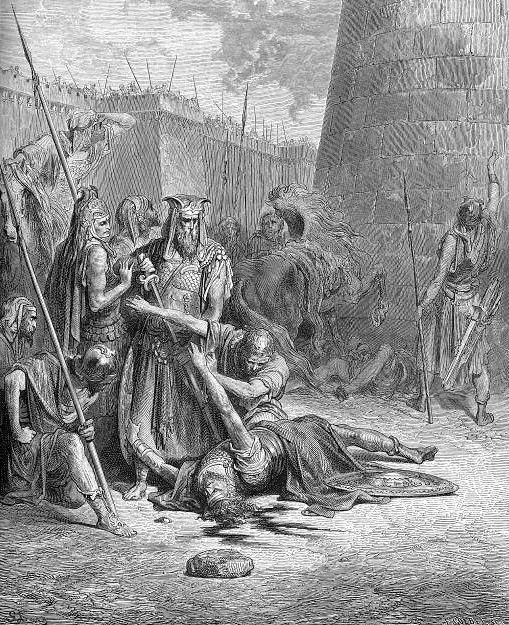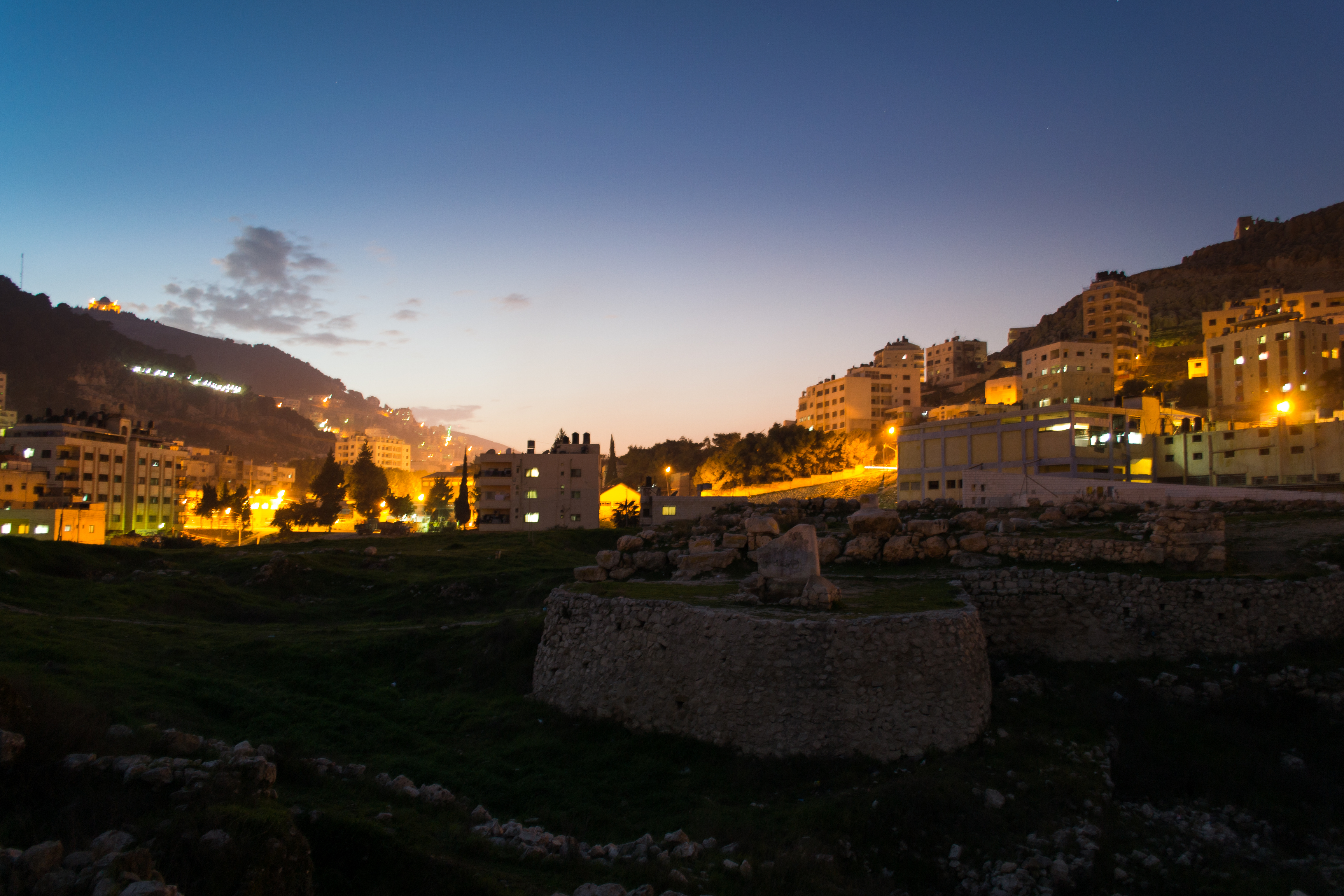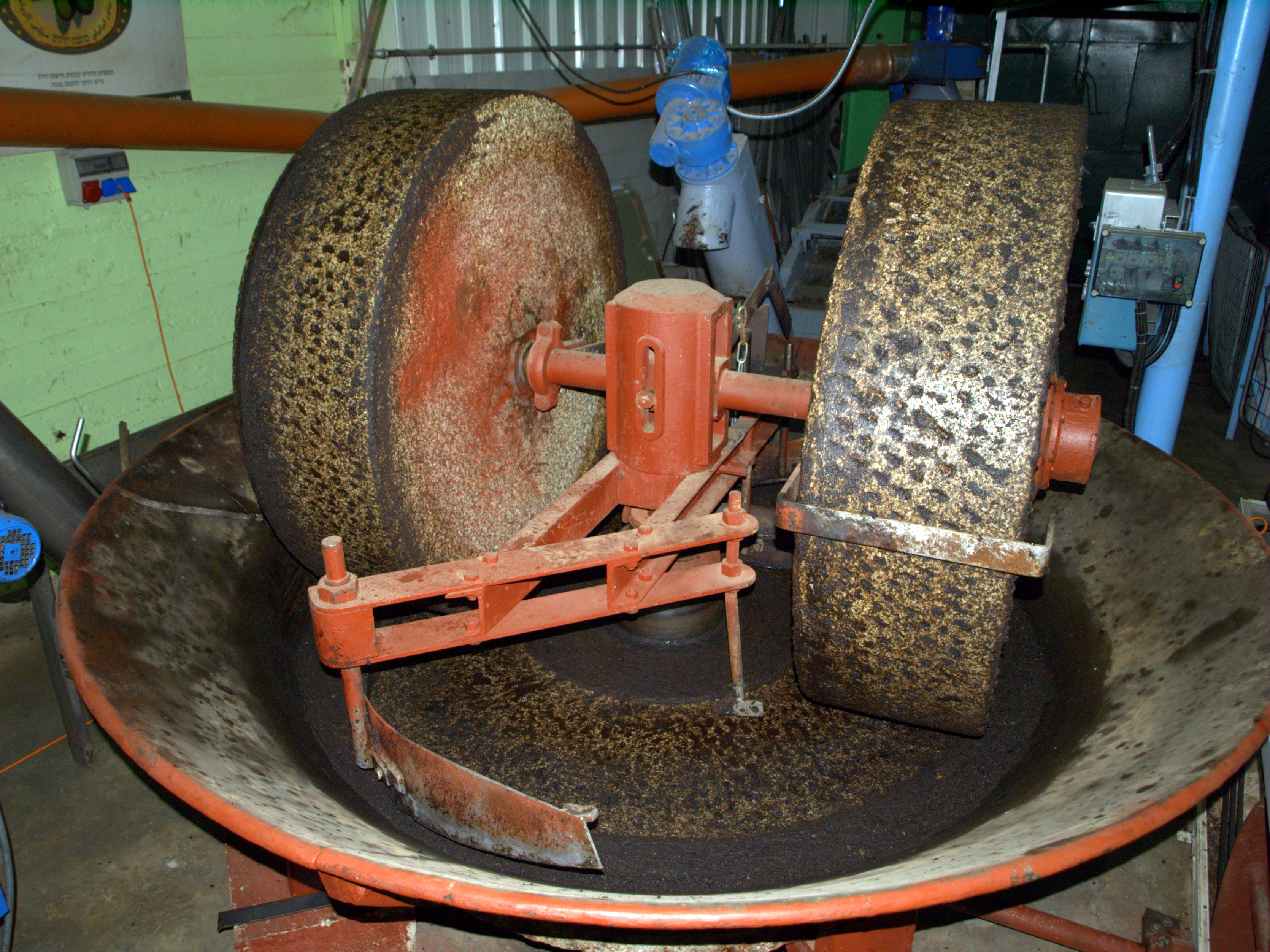|
Abimelech
Abimelech (also spelled Abimelek or Avimelech; ) was the generic name given to all Philistine kings in the Hebrew Bible from the time of Abraham through King David. In the Book of Judges, Abimelech, son of Gideon, of the Tribe of Manasseh, is proclaimed king of Shechem after the death of his father. Etymology The name or title ''Abimelech'' is formed from Canaanite words for "father" and "king," and may be interpreted in a variety of ways, including "Father-King", "My father is king," or "Father of a king." In the Pentateuch, it is used as a title for kings in the land of Canaan. Abimelech can be translated in Arabic as well into "My father is king", "My father is owner" or "Father of a king," where () means father or my father while () means king or () for owner. At the time of the Amarna tablets (mid-14th century BC), there was an Egyptian governor of Tyre similarly named Abimilki, Abimelech of Gerar Abimelech was most prominently the name of a polytheistic kin ... [...More Info...] [...Related Items...] OR: [Wikipedia] [Google] [Baidu] |
Abimelech (Judges)
Abimelech (; ''’'') or Abimelek was the king of Shechem and the tribal territory of Manasseh, and a son of biblical judge Gideon. His name can best be interpreted as "my father is king", claiming the inherited right to rule. He is introduced in Judges 8:31 as the son of Gideon and his Shechemite concubine, and the biblical account of his reign is described in chapter nine of the Book of Judges. According to the Bible, he was an unprincipled and ambitious ruler who often engaged in wars against his own subjects. Ascension to kingship The killing of seventy brothers According to the Book of Judges, Abimelech went to Shechem to meet with his uncles and grandfather of his mother's side, and claimed to them that he should be the sole ruler over them and Shechem and not his brothers. He asked them whether they'd prefer to be ruled by seventy rulers or just by the individual, and he affirmed them as equal brothers. Because of Abimelech's affirmation to them, the men inclined t ... [...More Info...] [...Related Items...] OR: [Wikipedia] [Google] [Baidu] |
Wife–sister Narratives In The Book Of Genesis
In biblical studies, the term wife–sister narratives in Genesis refers to three strikingly similar stories in chapters 12, 20, and 26 of the Book of Genesis (part of the Torah and Old Testament). At the core of each is the story of a biblical patriarch who has come to be in the land of a powerful foreign overlord who misidentifies the Patriarch's wife as the Patriarch's sister, and consequently attempts to wed her himself. The overlord later finds out his error. Two of the three stories are similar in many other details, including the ruler's name, Abimelech. Synopsis of the three narratives Abram and Pharaoh The first episode appears in . Abram (later called Abraham) moves to ancient Egypt in order to evade a famine. Because his wife, Sarai (later called Sarah), is very beautiful, Abram asks her to say that she is only his sister lest the Egyptians kill him so that they can take her. On arriving before the Pharaoh, the Egyptians recognise Sarai's beauty, and the Egyptian pr ... [...More Info...] [...Related Items...] OR: [Wikipedia] [Google] [Baidu] |
Abraham
Abraham (originally Abram) is the common Hebrews, Hebrew Patriarchs (Bible), patriarch of the Abrahamic religions, including Judaism, Christianity, and Islam. In Judaism, he is the founding father who began the Covenant (biblical), covenantal relationship between the Jewish people and God in Judaism, God; in Christianity, he is the spiritual progenitor of all believers, whether Jewish or gentile, non-Jewish; and Abraham in Islam, in Islam, he is a link in the Prophets and messengers in Islam, chain of Islamic prophets that begins with Adam in Islam, Adam and culminates in Muhammad. Abraham is also revered in other Abrahamic religions such as the Baháʼí Faith and the Druze, Druze faith. The story of the life of Abraham, as told in the narrative of the Book of Genesis in the Hebrew Bible, revolves around the themes of posterity and land. He is said to have been called by God to leave the house of his father Terah and settle in the land of Canaan, which God now promises to Ab ... [...More Info...] [...Related Items...] OR: [Wikipedia] [Google] [Baidu] |
Gideon
Gideon (; ) also named Jerubbaal and Jerubbesheth, was a military leader, judge and prophet whose calling and victory over the Midianites is recounted in of the Book of Judges in both the Hebrew Bible and the Christian Bible. Gideon was the son of Joash, from the Abiezrite clan in the tribe of Manasseh and lived in Ephra (Ophrah). As a leader of the Israelites, he won a decisive victory over a Midianite army despite a vast numerical disadvantage, leading a troop of 300 men. Archaeologists in southern Israel have found a 3,100-year-old fragment of a jug with five letters written in ink that appear to represent the name Jerubbaal, or Yeruba'al. Names The nineteenth-century Strong's Concordance derives the name "Jerubbaal" from "Baal will contend", in accordance with the folk etymology, given in . According to biblical scholar Lester Grabbe (2007), " udges6.32 gives a nonsensical etymology of his name; it means something like 'Let Baal be great. Likewise, where Strong ga ... [...More Info...] [...Related Items...] OR: [Wikipedia] [Google] [Baidu] |
Isaac
Isaac ( ; ; ; ; ; ) is one of the three patriarchs (Bible), patriarchs of the Israelites and an important figure in the Abrahamic religions, including Judaism, Christianity, Islam, and the Baháʼí Faith. Isaac first appears in the Torah, in which he is the son of Abraham and Sarah, the father of Jacob and Esau, and the grandfather of the Twelve Tribes of Israel, twelve tribes of Israel. Isaac's name means "he will laugh", reflecting the laughter, in disbelief, of Abraham and Sarah, when told by God that they would have a child., He is the only patriarch whose name was not changed, and the only one who did not move out of Canaan. According to the narrative, he died aged 180, the longest-lived of the three patriarchs. Recent scholarship has discussed the possibility that Isaac could have originally been an ancestor from the Beersheba region who was venerated at a sanctuary. Etymology The anglicized name "Isaac" is a transliteration of the Hebrew language, Hebrew name () whic ... [...More Info...] [...Related Items...] OR: [Wikipedia] [Google] [Baidu] |
Shechem
Shechem ( ; , ; ), also spelled Sichem ( ; ) and other variants, was an ancient city in the southern Levant. Mentioned as a Canaanite city in the Amarna Letters, it later appears in the Hebrew Bible as the first capital of the Kingdom of Israel (Samaria), Kingdom of Israel following the split of the Kingdom of Israel (united monarchy), United Monarchy. According to , it was located in the tribal territorial allotment of the tribe of Ephraim. Shechem declined after the fall of the Kingdom of Israel (Samaria), northern Kingdom of Israel. The city later regained its importance as a prominent Samaritans, Samaritan center during the Hellenistic Palestine, Hellenistic period. Traditionally associated with the city of Nablus, Shechem is now identified with the nearby site of Tell Balata in the Balata al-Balad suburb of the West Bank. Geographical position Shechem's position is indicated in the Hebrew Bible: it lay north of Bethel and Shiloh (Biblical city), Shiloh, on the high road ... [...More Info...] [...Related Items...] OR: [Wikipedia] [Google] [Baidu] |
Gerar
Gerar ( ''Gərār'', "lodging-place") was a Philistine town and district in what is today south central Israel, mentioned in the Book of Genesis and in the Second Book of Chronicles of the Hebrew Bible. Identification According to the International Standard Bible Encyclopedia, the biblical ''valley of Gerar'' () was probably located in the area of a valley known in Arabic as Wady Sheri'a, and in Modern Hebrew as Nahal Gerar. Most commentators see the mound of Tel Haror (Hebrew) or Tell Abu Hureyra (Arabic) as representing the ancient Gerar. Some older commentaries, such as Smith's Bible Dictionary, stated simply that Gerar was located "south of Gaza". Also, a ninth century rabbinical source, Saadia Gaon, identified Gerar with Haluza, which is located along the Besor Stream in the Negev.On Haluza's proximity to Gerar, see: M. Naor, Gerar — Tell el Far'a, Bulletin of the Israel Exploration Society (1955), pp. 99–102 (Hebrew) However, according to recent archaeological re ... [...More Info...] [...Related Items...] OR: [Wikipedia] [Google] [Baidu] |
Book Of Judges
The Book of Judges is the seventh book of the Hebrew Bible and the Christian Old Testament. In the narrative of the Hebrew Bible, it covers the time between the conquest described in the Book of Joshua and the establishment of a kingdom in the Books of Samuel, during which Hebrew Bible judges, Biblical judges served as temporary leaders. The stories follow a consistent pattern: the people are unfaithful to Yahweh; he therefore delivers them into the hands of their enemies; the people repent and entreat Yahweh for mercy, which he sends in the form of a leader or champion; the judge delivers the Israelites from oppression and they prosper, but soon they fall again into unfaithfulness and the cycle is repeated. The pattern also expresses a repeating cycle of wars. But in the last verse (21:25) there is a hint that the cycle can be broken—with the establishment of a monarchy. While most contemporary critical scholars reject the historical accuracy of the Book of Judges, some arg ... [...More Info...] [...Related Items...] OR: [Wikipedia] [Google] [Baidu] |
Biblical Judges
The judges (sing. , pl. ) whose stories are recounted in the Hebrew Bible, primarily in the Book of Judges, were individuals who served as military leaders of the tribes of Israel in times of crisis, in the period before the monarchy was established. Role A cyclical pattern is regularly recounted in the Book of Judges to show the need for the various judges: apostasy of the Israelite people, hardship brought on as divine retribution, and crying out to Yahweh for rescue. Consequently, the God chooses a judge from a certain tribe of Israel who rescues the people from the divine retribution, usually enemies, and establishes justice. While ''judge'' is a literalistic translation of the term '' shophet'' used in the Masoretic Text (as well as by other Canaanitic-speaking societies), the position as described in Judges 12:7–15 is an unelected non-hereditary leadership rather than a position of legal pronouncements. Cyrus H. Gordon argued the shophetim may have come from among ... [...More Info...] [...Related Items...] OR: [Wikipedia] [Google] [Baidu] |
David
David (; , "beloved one") was a king of ancient Israel and Judah and the third king of the United Monarchy, according to the Hebrew Bible and Old Testament. The Tel Dan stele, an Aramaic-inscribed stone erected by a king of Aram-Damascus in the late 9th/early 8th centuries BCE to commemorate a victory over two enemy kings, contains the phrase (), which is translated as " House of David" by most scholars. The Mesha Stele, erected by King Mesha of Moab in the 9th century BCE, may also refer to the "House of David", although this is disputed. According to Jewish works such as the '' Seder Olam Rabbah'', '' Seder Olam Zutta'', and '' Sefer ha-Qabbalah'' (all written over a thousand years later), David ascended the throne as the king of Judah in 885 BCE. Apart from this, all that is known of David comes from biblical literature, the historicity of which has been extensively challenged,Writing and Rewriting the Story of Solomon in Ancient Israel; by Isaac Kalimi; page 3 ... [...More Info...] [...Related Items...] OR: [Wikipedia] [Google] [Baidu] |
Millstone
Millstones or mill stones are stones used in gristmills, used for triturating, crushing or, more specifically, grinding wheat or other grains. They are sometimes referred to as grindstones or grinding stones. Millstones come in pairs: a stationary base with a convex rim known as the bedstone (or nether millstone) and a concave-rimmed runner stone that rotates. The movement of the runner on top of the bedstone creates a "scissoring" action that grinds grain trapped between the stones. Millstones are constructed so that their shape and configuration help to channel ground flour to the outer edges of the mechanism for collection. The runner stone is supported by a cross-shaped metal piece ( millrind or rynd) fixed to a "mace head" topping the main shaft or spindle leading to the driving mechanism of the mill (wind, water (including tide), or other means). History The origins of an industry Often referred to as the "oldest industry", the use of the millstone is inextr ... [...More Info...] [...Related Items...] OR: [Wikipedia] [Google] [Baidu] |
Ahimelech
Ahimelech ( ''ʾĂḥīmeleḵ'', "my brother is king"/"brother of a king") was an Israelite priest and served as the grand priest of the town of Nob. In the Book of Samuel, he was described as the son of Ahitub and father of Abiathar (), but described as the son of Abiathar in and in four places in 1 Chronicles."Ahimelech", ''Encyclopedia Biblica'' He descended from Aaron's son Ithamar and the High Priest of Israel Eli. In his name is Abimelech according to the Masoretic Text, and is probably the same as Ahiah (). Relation to David He was the twelfth High Priest, and officiated at Nob, where he was visited by David (he gave David and his companions five loaves of the showbread) when David fled from Saul (). He was summoned into Saul's presence, and accused of disloyalty for assisting David, on the information of Doeg the Edomite. Then the king commanded that he, with the other priests who stood beside him, 86 in all, should be slain with his family. This sentence was ... [...More Info...] [...Related Items...] OR: [Wikipedia] [Google] [Baidu] |










